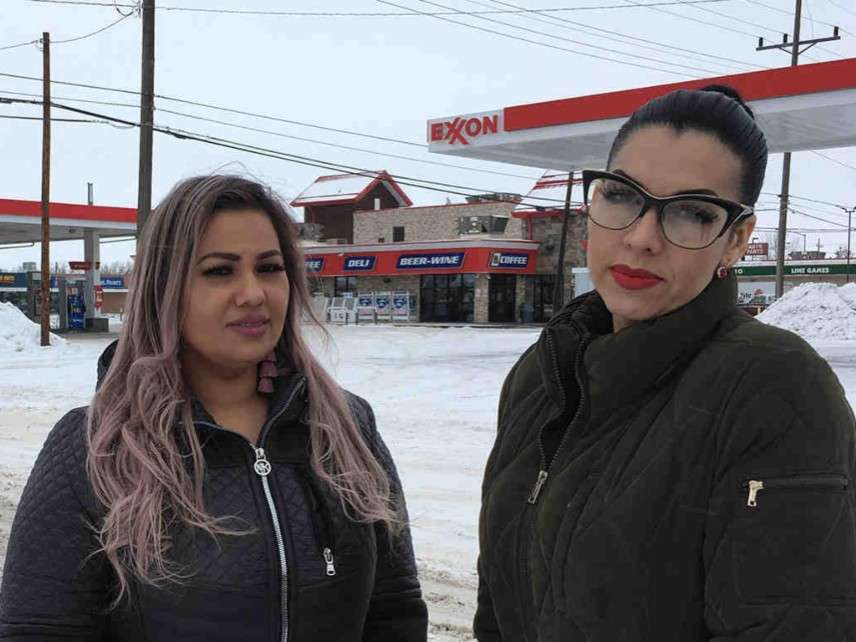U.S. Citizens Sue Border Patrol Agent Who Detained Them for Speaking Spanish
The ACLU argues that the 40-minute detention violated the Fourth and 14th amendments.

"So it is illegal to speak Spanish in Montana?" Ana Suda asked Border Patrol Agent Paul O'Neal after he detained her and her friend Mimi Hernandez at a convenience store in Havre, a small town near the border with Canada, on a Wednesday evening last May. "Well, ma'am," O'Neal replied, "it's not illegal. It's just very unheard of up here." And that, to his mind, provided reasonable suspicion that the two women, both U.S. citizens and Havre residents, were in the country illegally, justifying a 40-minute detention while he investigated their immigration status.
O'Neal was wrong about that, according to a lawsuit filed by the American Civil Liberties Union yesterday. "There was no legitimate reason for Agent O'Neal and other CBP [Customs and Border Protection] agents to detain Ms. Suda and Ms. Hernandez," the complaint says. "Speaking Spanish does not establish reasonable suspicion justifying a stop and detention, much less probable cause for an arrest." The ACLU is asking for compensatory and punitive damages as well as an injunction barring CBP from "stopping and/or detaining individuals on the basis of race, accent, and/or speaking Spanish, except where the seizure is based on a specific and reliable suspect description matching such characteristics."

Suda and Hernandez, certified nurse assistants who work at the Northern Montana Care Center, were not suspects until O'Neal, who is assigned to CBP's Havre office, heard them speaking Spanish at the Town Pump convenience store, where they had stopped to pick up eggs and milk after exercising together at a local gym. When Hernandez greeted him in English, O'Neal, who was wearing his uniform and carrying a gun, commented on her accent and asked her and Suda where they were born. "Are you serious?" Suda said, according to her account. "Dead serious," O'Neal replied. So they answered him: El Paso, Texas, Suda said. El Centro, California, Hernandez said. O'Neal asked for identification, and the women handed over their Montana driver's licenses.
Although Montana requires applicants for driver's licenses to provide "proof of authorized presence," such as a birth certificate or a passport, O'Neal was not satisfied. He kept Suda and Hernandez detained in the store's parking lot for another half an hour or so while he checked on outstanding warrants, called a supervisor, and waited for him to arrive.
In a cellphone video that Suda and Hernandez shot outside the store, one of them asks O'Neal, "Can you tell us in the video, please, why you ask us for our IDs?" His reply does not leave him much legal wiggle room: "Ma'am, the reason I asked you for your ID is because I came up in here and saw that you guys are speaking Spanish, which is very unheard of up here….It has to do with you guys speaking Spanish in the store in a state where it's predominantly English-speaking."
According to the complaint, Suda asked O'Neal's supervisor whether she and Hernandez would have been detained if they had been speaking French. "No, we don't do that," the supervisor replied. The ACLU argues that O'Neal used the women's language and accents as proxies for race, thereby violating the 14th Amendment's guarantee of equal protection as well as the Fourth Amendment's ban on unreasonable seizures.
In 2006 the U.S. Court of Appeals for the 9th Circuit, which includes Montana, ruled that Border Patrol agents in Havre violated the Fourth Amendment when they detained six Latino men at a high school football game based on their "appearance as a work crew," their proximity to the border, and their inability to speak English. While those factors were relevant in establishing reasonable suspicion, the appeals court said, they did not suffice to meet that threshold. It pretty clearly follows that speaking Spanish as well as English, as Suda and Hernandez do, cannot establish reasonable suspicion.
Suda says the incident and the publicity surrounding it have made life in Havre uncomfortable. "After the video of the stop was picked up by the news," she writes on the ACLU's blog, "Mimi and my families have been harassed repeatedly for speaking out. We received hateful messages from people across the country, but the worst was what happened in our own town, a place I considered home. At his high school, a teacher asked Mimi's son whether he had brought his ID to class. My 8-year-old daughter is scared to speak Spanish and has started responding to me in English when I ask her questions….I've had people yell at me in restaurants and bars, saying that I am 'an illegal.'"
Suda concedes that she could have avoided this backlash if she had kept quiet about the encounter with O'Neal. "Maybe life would have gone back to normal," she says, "but then I think about my kids. I want them to not only be proud of being bilingual, but I also want them to know that they live in a country where people can't just be stopped and interrogated based on how they look and sound."
